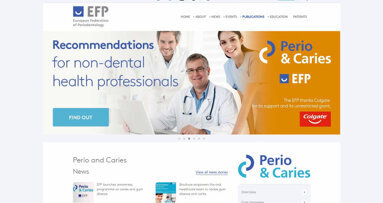BOSTON, U.S.: Effective preventive treatments for dental caries exist; yet caries experience among preschoolers has not changed significantly. Children from socially disadvantaged families are particularly affected by it. For young children, the role of the primary caregiver is especially important in reducing caries risk. Now, researchers at Boston University have taken advantage of a tool that is already part of everyday life: the cellphone. In a recent study, they used text messaging to improve the oral health of children—with promising results.
For the study, 55 participants with children younger than 7 years were recruited, three-quarters of whom live below the poverty line. Participants in the study were parents or caregivers of children who were patients of pediatric clinics in two community health centers in an urban and underserved area of Boston.
The research team divided the participants randomly into two groups. One group received oral health text messages (OHT) including information on topics such as brushing, dental visits and fluoride, and the control group received child wellness messages (CWT) with material on the general well-being of children, such as safety and physical activity.
The program provided participants with two text messages per day for eight weeks. The messages for both groups were designed to be of an interactive nature and to present opportunities to earn badges and unlock animated characters.
“Ours is the first text message study focusing on oral health and measuring outcomes in a randomized trial with prospective outcomes. It is also the first oral health text messaging program that is customized to the patient, automated yet interactive, and involves gamification,” lead author Dr. Belinda Borrelli, professor in the Department of Health Policy and Health Services Research at the Henry M. Goldman School of Dental Medicine at the university, told Dental Tribune International.
Evaluation of the follow-up clearly showed that this form of communication was received very positively—84% of the OHT group said that they would recommend the program to others. The participants reported a high perceived impact of the OHT program on brushing their children’s teeth, motivating them to address their children’s oral health, and expanding their knowledge of their children’s oral health needs. At follow-up, compared with CWT, the OHT group participants were more likely to brush their children’s teeth twice per day and demonstrated improved attitudes regarding the use of fluoride and toward getting regular dental checkups for their children.
In response to a question about what the greatest advantages of the text messaging program are, Borrelli said: “Through text messaging, we can target previously unreachable populations with evidence-based information that they can access in real time—most people carry their cellphones throughout the day—wherever they happen to be when the text comes in.”
Based on the study results, the researchers secured funding from the National Institute of Dental and Craniofacial Research in order to conduct a larger trial on the text message intervention; currently, 650 families are enrolled in the study.
“This study demonstrates the potential of text message interventions and provides evidence that a larger, fully powered randomized controlled trial is needed,” added Borrelli. “This is the type of program that, if proved effective, could be disseminated nationally to other federally qualified pediatric clinics and ultimately make a real difference in the oral health of at-risk children.”
The study, titled “An interactive parent-targeted text messaging intervention to improve oral health in children attending urban pediatric clinics: Feasibility randomized controlled trial,” was published in the November 2019 issue of JMIR mHealth and uHealth.
Tags:
INDIANAPOLIS, U.S.: With the goal of improving oral health for better overall physical and emotional health, Regenstrief Institute and the Indiana ...
NEW YORK, U.S.: In a bid to help children in foster care improve their oral health, New York City’s Administration for Children’s Services (ACS) and the...
SYDNEY, Australia: In a follow-up to its Dental Health Week 2017 campaign, held from 7 to 13 August, the Australian Dental Association (ADA) is reminding ...
SÃO PAULO, Brazil: Sugar substitutes have been promoted as a healthier alternative because of their low cariogenic potential and role in reducing caries ...
GENEVA, Switzerland: In the run-up to World Oral Health Day (WOHD), which took place on Sunday, 20 March, FDI World Dental Federation presented a webinar ...
COPENHAGEN, Denmark: The authors of a recent study have investigated whether high-dose vitamin D supplementation during the third trimester of pregnancy ...
CHICAGO, U.S.: For a number of years, dentists throughout America have been working to improve access to oral health care for those in underserved regions. ...
MADRID, Spain: The European Federation of Periodontology (EFP), a non-profit umbrella organisation of 30 national scientific societies of periodontology, ...
It is increasingly recognised that general medical care and dental care should be more closely linked. To that end, the European Federation of ...
LONDON, UK: Seeking to improve oral cancer detection and treatment, researchers from Queen Mary University of London have developed the first polymerase ...
Live webinar
Tue. 24 February 2026
1:00 pm EST (New York)
Prof. Dr. Markus B. Hürzeler
Live webinar
Tue. 24 February 2026
3:00 pm EST (New York)
Prof. Dr. Marcel A. Wainwright DDS, PhD
Live webinar
Wed. 25 February 2026
11:00 am EST (New York)
Prof. Dr. Daniel Edelhoff
Live webinar
Wed. 25 February 2026
1:00 pm EST (New York)
Live webinar
Wed. 25 February 2026
8:00 pm EST (New York)
Live webinar
Tue. 3 March 2026
11:00 am EST (New York)
Dr. Omar Lugo Cirujano Maxilofacial
Live webinar
Tue. 3 March 2026
8:00 pm EST (New York)
Dr. Vasiliki Maseli DDS, MS, EdM



 Austria / Österreich
Austria / Österreich
 Bosnia and Herzegovina / Босна и Херцеговина
Bosnia and Herzegovina / Босна и Херцеговина
 Bulgaria / България
Bulgaria / България
 Croatia / Hrvatska
Croatia / Hrvatska
 Czech Republic & Slovakia / Česká republika & Slovensko
Czech Republic & Slovakia / Česká republika & Slovensko
 France / France
France / France
 Germany / Deutschland
Germany / Deutschland
 Greece / ΕΛΛΑΔΑ
Greece / ΕΛΛΑΔΑ
 Hungary / Hungary
Hungary / Hungary
 Italy / Italia
Italy / Italia
 Netherlands / Nederland
Netherlands / Nederland
 Nordic / Nordic
Nordic / Nordic
 Poland / Polska
Poland / Polska
 Portugal / Portugal
Portugal / Portugal
 Romania & Moldova / România & Moldova
Romania & Moldova / România & Moldova
 Slovenia / Slovenija
Slovenia / Slovenija
 Serbia & Montenegro / Србија и Црна Гора
Serbia & Montenegro / Србија и Црна Гора
 Spain / España
Spain / España
 Switzerland / Schweiz
Switzerland / Schweiz
 Turkey / Türkiye
Turkey / Türkiye
 UK & Ireland / UK & Ireland
UK & Ireland / UK & Ireland
 Brazil / Brasil
Brazil / Brasil
 Canada / Canada
Canada / Canada
 Latin America / Latinoamérica
Latin America / Latinoamérica
 USA / USA
USA / USA
 China / 中国
China / 中国
 India / भारत गणराज्य
India / भारत गणराज्य
 Pakistan / Pākistān
Pakistan / Pākistān
 Vietnam / Việt Nam
Vietnam / Việt Nam
 ASEAN / ASEAN
ASEAN / ASEAN
 Israel / מְדִינַת יִשְׂרָאֵל
Israel / מְדִינַת יִשְׂרָאֵל
 Algeria, Morocco & Tunisia / الجزائر والمغرب وتونس
Algeria, Morocco & Tunisia / الجزائر والمغرب وتونس
 Middle East / Middle East
Middle East / Middle East











































To post a reply please login or register